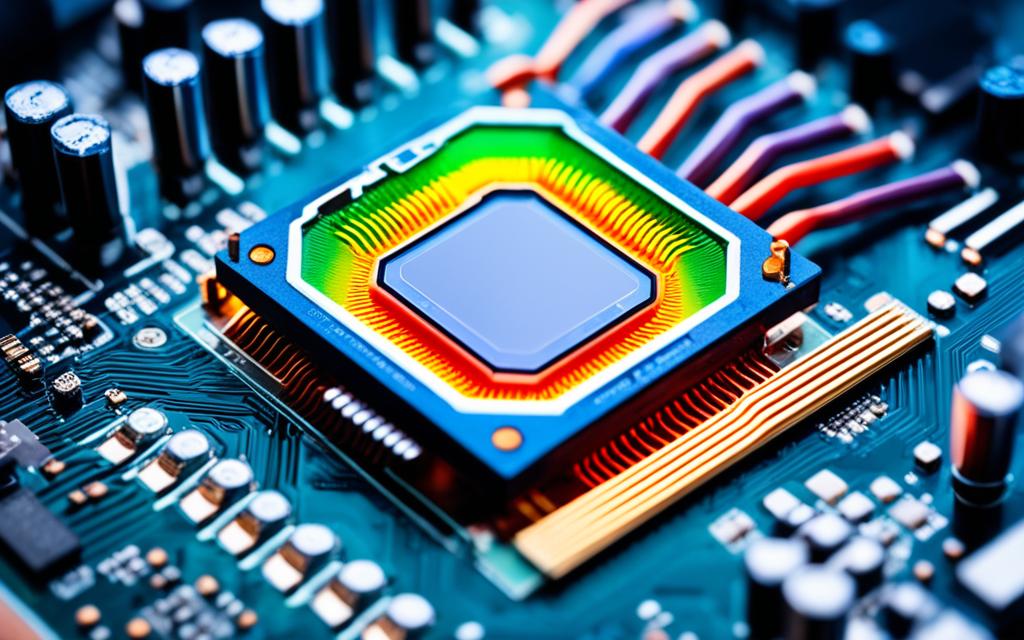Table of Contents
Understanding CPU temperature limits is key as technology gets better. Many CPUs can be safe up to 100°C1. Yet, regularly running at these high temperatures can cause problems. One major issue is thermal throttling, which slows down the CPU’s processing power2. It’s important for computer users to know about CPU temperatures. This knowledge helps protect their device and keep it running smoothly.
Key Takeaways
- Most CPUs can handle up to 100°C but should not be operated at this limit regularly.
- Normal operating temperatures range from 60 to 80°C under full load.
- Effective cooling systems are essential for maintaining CPU health and performance.
- Thermal throttling occurs when CPUs reach maximum temperatures, reducing efficiency.
- Regular maintenance and monitoring can prevent overheating issues.
Understanding CPU Temperature Ranges
Keeping a CPU cool is key for its best performance and long life. When doing normal tasks, CPU temperatures should be between 40-60°C. But, under heavy use, it may go up to 80°C. If it goes above 90°C, it could mean the cooling isn’t enough or the workload is too much. This may harm the CPU3. Modern CPUs can handle near 100°C temperatures for a short time4. However, keeping them too hot for too long can damage them over time.
Normal Operating Temperatures
For best performance, CPUs should stay between 50°C to 80°C when in use. They usually work well from 30°C to 80°C5. It’s advised to keep them under 80°C to prevent damage and maintain good performance4. Going over 100°C can cause the CPU to slow down automatically one33. This is to prevent damage but can reduce performance, making it important to watch the temperature.
What Causes High Temperatures?
High CPU temperatures can come from poor cooling, like bad heatsinks or thermal paste3. Dust blocking vents also stops good airflow, and hot rooms can make it worse. High-power CPUs, like those for gaming, usually run hotter than simpler ones in laptops5. High temperatures can cause crashes or the system to stop, showing why managing CPU temperature is vital4.
Is 100°C Too Hot for a CPU?
Understanding the 100°C CPU specifications is key. It helps us know the thermal limits set by makers for the best use and longevity. For instance, Intel’s Core i5-12600k can go up to 100°C safely, showing us that CPUs can work well up to this point without breaking down3. However, keeping them this hot for too long might affect how reliable they are.
Manufacturer Specifications
Makers set these high temp limits after lots of tests. It’s true that some CPUs, especially some Intel models, can bear such heat. But, we should be careful2. High heat can cause the CPU to slow down to cool off3. This might undo the benefits of trying to overclock or max out CPU power.
Impact on Performance and Longevity
Staying at 100°C too often can harm the CPU’s life. High temps for too long puts extra strain on the parts, making them fail early. This means that while the CPU tries to cool down by slowing, the damage over time can make it less stable3. Ideally, CPU temps should stay below 70-80°C under a lot of use, as going over 90°C is a worrying sign1.
There are tips online for keeping temps down, like undervolting. Finding the right balance between high performance and lower temps is vital. High temperatures can cause system and component issues, pushing the limits of what’s safe for the CPU.
Factors Influencing CPU Temperature
Knowing what affects CPU temperature is key to better performance and less risk of overheating. Cooling solutions, the environment, and how much the CPU is used are big factors. They all help decide how hot your CPU gets.
Cooling Solutions
Cooling your CPU well is important to keep it running smoothly. Standard coolers work okay, but special aftermarket coolers do better. Studies show that using a standard cooler sees about a 2.5% performance drop6. Aftermarket coolers can keep the temperature around 80°C. This means your computer works well even when it’s really busy.
Environmental Considerations
Your surroundings can change how hot your CPU gets. Warm room temperatures make it harder for air to cool the CPU down. Keeping the computer clean and in a spacious spot helps stop it from getting too hot. Also, regular cleaning stops dust from blocking the coolers.
Performance Loads and Thermal Throttling
Hard tasks like playing games or editing videos can heat the CPU a lot. This can slow the CPU down to stop it from overheating. Intel CPUs can work normally up to 100°C. But staying above 99°C too long can cause problems6. When it gets too hot, the CPU might not work as it should7. Ryzen CPUs adjust their speed to avoid overheating, which might make them slower when they’re really busy7.
| Cooling Solution | Maximum Temperature (°C) | Performance Drop (%) |
|---|---|---|
| Stock Cooler | Above 99°C 20% of the time | 2.5% |
| Aftermarket Cooler | Around 80°C | Minimal |
Choosing the right cooling method is crucial to handle CPU temperature well. It also matters to think about where your computer is and how hard you push it. Knowing how these things connect helps keep your CPU in good shape and makes your computer work better67.
How to Manage and Reduce CPU Temperatures
Keeping your CPU cool is key for good performance and a long life. You can control your CPU’s heat using several methods. It’s important to know how to do this for a reliable computer.
Improving Case Airflow
Good airflow inside your computer case is vital. Make sure cables are tidy and add more fans if needed. This makes your system cooler and more efficient.
Reapplying Thermal Paste
The thermal paste between your CPU and heatsink can dry out over time. You should use quality thermal paste regularly. This keeps your CPU within safe temperatures and prevents damage5.
Using Aftermarket Coolers
Better cooling systems can make a big difference. Both air and liquid coolers offer superior performance over standard coolers. They are great for keeping temperatures down during intense tasks8.
Monitoring Software and Tools
Tools like HWMonitor and Core Temp help you watch your CPU heat in real-time. This way, you can adjust your cooling as needed. Using these tools keeps your system stable when it’s working hard for proper temperature checks8.
| Cooling Method | Benefits | Considerations |
|---|---|---|
| Improving Case Airflow | Increased airflow reduces heat buildup | Requires proper cable management |
| Reapplying Thermal Paste | Enhances heat transfer efficiency | Must be done periodically to maintain effectiveness |
| Using Aftermarket Coolers | Superior cooling performance under load | Higher initial cost compared to stock coolers |
| Monitoring Software | Real-time temperature tracking | Requires awareness of temperature limits |
Conclusion
Knowing how to manage a CPU’s temperature is key. CPUs can deal with high heat for short times, like up to 100°C. But, constantly being that hot can harm its performance and life. It’s vital to keep the CPU cool, especially when you’re doing heavy tasks like video editing or gaming910.
Despite new cooling tech, some users forget about dust and old thermal paste. These factors can lower CPU efficiency911. Regularly cleaning and possibly upgrading your cooling system is important. This helps your CPU work well, even under a lot of stress.
Being proactive with CPU temperatures boosts your computing experience and extends your CPU’s lifespan. By focusing on cooling and watching temperatures, you protect your system from overheating. This ensures it runs well for many years.
FAQ
What is considered a normal temperature range for a CPU?
A CPU typically works well between 40-70°C for everyday use. When under a lot of pressure, it might get up to 80°C. Going over 90°C is worrying and may mean your cooling isn’t enough.
What might cause my CPU to overheat?
Overheating can happen if your cooling isn’t good enough, or there’s too much dust. Maybe your room is too warm, or airflow in your computer isn’t great. Also, some CPUs just get hotter than others when busy.
What are the maximum safe temperatures for CPUs?
Most CPUs can handle up to near 100°C, but it’s not good to keep them there too long. High heat for too long can hurt them. Always check what the maker says is okay.
How does high temperature affect CPU performance and longevity?
Keeping a CPU too hot, near 100°C, can make it not last as long. It wears out faster and might not work well. It could even stop working sooner than expected.
What cooling solutions are effective for managing CPU temperatures?
To keep things cool, you have a few choices. There are stock coolers, better coolers you can buy, or liquid-based systems. Making sure they’re put on right with good thermal paste is key.
What environmental factors influence CPU temperature?
The temperature around you and how air moves in your computer case can change CPU temperature. Keeping things clean and not too crowded helps stop overheating.
How can I tell if my CPU is overheating?
Tools like HWMonitor or Core Temp let you watch your CPU’s temperature live. They help make sure it stays in a safe range.
What steps can I take to improve case airflow?
To get better airflow, tidy up any messy cables and add more fans to your case. Make sure there’s enough room around your computer so air can move freely.
Why is reapplying thermal paste important?
Thermal paste can dry out and not work as well over time. Putting on fresh, quality thermal paste helps keep your CPU cool by moving heat to the heatsink better.
Should I consider upgrading my cooling solution?
If you’re pushing your computer hard, a better cooling setup might help. Either a fancy air cooler or a liquid system can make a big difference in keeping temperatures down.
Source Links
- https://community.acer.com/en/discussion/671445/is-it-okay-for-my-laptops-cpu-to-run-at-100-c-when-in-extreme-mode – Is it okay for my laptop’s CPU to run at 100°C when in Extreme mode?
- https://www.overclock.net/threads/is-it-safe-to-squeeze-100°c-on-a-cpu-like-alder-lake.1798561/ – Is it safe to squeeze 100°C on a CPU like Alder Lake?
- https://community.spiceworks.com/t/what-is-a-normal-temperature-for-a-cpu-and-how-do-i-keep-it-low/948818 – What is a normal temperature for a CPU and how do I keep it low?
- https://www.techylop.com/is-100c-too-hot-for-cpu/ – Is 100°C Too Hot for CPU – Ready Optimize CPU Performance!
- https://softwareg.com.au/blogs/computer-hardware/is-100c-too-hot-for-cpu – Is 100C Too Hot For CPU
- https://www.pugetsystems.com/labs/articles/impact-of-temperature-on-intel-cpu-performance-606/ – Impact of Temperature on Intel CPU Performance
- https://forums.tomshardware.com/threads/how-does-age-and-sustained-high-temperatures-affect-the-performance-of-a-cpu-gpu.3738219/ – [SOLVED] – How does age and sustained high temperatures affect the performance of a CPU/GPU?
- https://www.techpowerup.com/forums/threads/what-settings-do-you-adjust-to-lower-cpu-temperatures.275882/ – What settings do you adjust to lower CPU temperatures?
- https://forum.videohelp.com/threads/324268-CPU-gets-really-hot-(-100CC-!)-and-computer-turns-off-Thoughts – CPU gets really hot (>100°C !) and computer turns off… Thoughts?
- https://forums.tomshardware.com/threads/cores-running-hot-at-100c-but-overall-cpu-is-low.2891740/ – Cores running hot at ~100C, but overall CPU is low?
- https://community.frame.work/t/solved-single-cpu-core-rising-to-100-c/53265 – [SOLVED] Single CPU Core rising to 100°C








